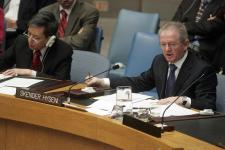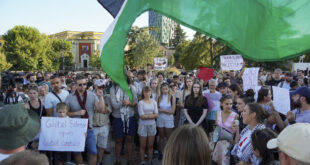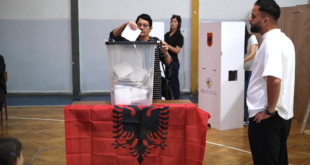 Kosovo’s Foreign Minister Skender Hyseni has won praise for his performance at the UN Security Council meeting on Monday with Kosovo Albanians saying his rally for the country has never been stronger.
Kosovo’s Foreign Minister Skender Hyseni has won praise for his performance at the UN Security Council meeting on Monday with Kosovo Albanians saying his rally for the country has never been stronger.
Hyseni addressed the council three times, and also argued against Serbia’s President Boris Tadic twice, dismissing his arguments.
“While listening to Mr. Tadic, we gain the impression that ten thousand Croatians were not killed, or one hundred thousand Bosnians were not massacred. Someone could gain the impression that fifteen thousand Albanians were not massacred, and almost one million Kosovo Albanians were not deported to Macedonia, Albania and Montenegro,” he said, adding that “while listening to Tadic, we gain the impression that everyone is to blame, except the Serbian regime.”
On the other hand, Tadic remained firm in stating, “It is obvious to everyone today that 13 months after the illegal, unilateral declaration of independence, Kosovo is no state,” labelling the country as a harbour of drug traffickers, mafia, sex trade and other criminal activities.
Hyseni argued that “we all are not angels in Kosovo”, and that most of the crime is present in the northern part of Kosovo, where parallel governing structures set up by Serbia exist because of the large Serb minority there, undermining Kosovo law and authority.
In his last words to the council, Hyseni requested the end of the United Nations Mission in Kosovo, UNMIK, which has been present in Kosovo for close to ten years.
“For very practical and pragmatic reasons, we request the end of the UNMIK mandate,” he said, which was met with support for wrapping up the mission from American and British representatives.
Russia’s representative and outspoken ally for Serbia maintained that UNMIK must continue to play the leading political and administrative role in Kosovo.
The United Nations began its provisional administration of Kosovo after the end of the 1998-1999 conflict. Its reconfiguration began with the deployment of an EU law and order mission, EULEX, late last year.
But Serbia opposes the exit of the UN mission, saying such a move will lead to the formalizing of Kosovo’s independence.
Since its declaration of independence in February 2008, Kosovo has since been recognised by 56 countries. Serbia, and key ally Russia, are staunchly against it.
 Eurasia Press & News
Eurasia Press & News


